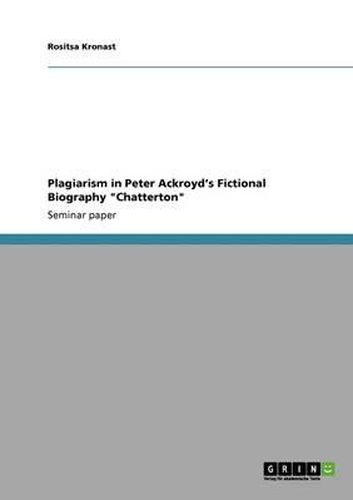Plagiarism in Peter Ackroyd's Fictional Biography Chatterton
Rositsa Kronast

Plagiarism in Peter Ackroyd’s Fictional Biography Chatterton
Rositsa Kronast
This title is printed to order. This book may have been self-published. If so, we cannot guarantee the quality of the content. In the main most books will have gone through the editing process however some may not. We therefore suggest that you be aware of this before ordering this book. If in doubt check either the author or publisher’s details as we are unable to accept any returns unless they are faulty. Please contact us if you have any questions.
Seminar paper from the year 2009 in the subject English Language and Literature Studies - Literature, grade: 1,3, LMU Munich (Department fur Anglistik und Amerikanistik), course: Hauptseminar Fictional Literary Biographies, language: English, abstract: By problematizing originality, authenticity and truth, this paper deals with the concept of plagiarism in a poststructuralist mode. It is especially concerned with the representation of plagiarism in Peter Ackroyd’s fictional literary biography Chatterton. The question at stake is: how does Chatterton play with pla(y)giarism? This challenging task requires a concise discussion of the addressed issues, which will be the aim of the following introduction. It reflects on the essence of plagiarism and fictional biography. Plagiarism originates from the Latin word plagiarius, meaning kidnapper or thief, stealing slaves. (See Zwierlein 2000, 499) It was not until the 18th century, however, that the word began to designate an intellectual theft. At that time artists became financially independent from their patrons and had to assert themselves on the literary market. (See Ackermann 1992, 22) Plagiarism has been recently regarded as Anmassung der geistlichen Urheberschaft: dadurch wird erstens der bewusste Akt der UEbernahme betont, zweitens die Tatsache, dass der Plagiator als der Schoepfer des entlehnten Materials auftritt . (Ackermann 1992, 18) According to this definition, plagiarism supposes, firstly, intentional arrogation of an intellectual work and, secondly, the plagiarist’s claim to be the creator of the stolen material. This production-oriented view gives rise to the following questions: who acknowledges the assumption of other works and classifies it as plagiarism? and who decides whether it is intentional or not? I consider a psychological explanation of a plagiarist’s motivation as an effect of readers’ perception and presumption. The social, political and aesthetic norms, defining plagiarism, are results from a
This item is not currently in-stock. It can be ordered online and is expected to ship in 7-14 days
Our stock data is updated periodically, and availability may change throughout the day for in-demand items. Please call the relevant shop for the most current stock information. Prices are subject to change without notice.
Sign in or become a Readings Member to add this title to a wishlist.

